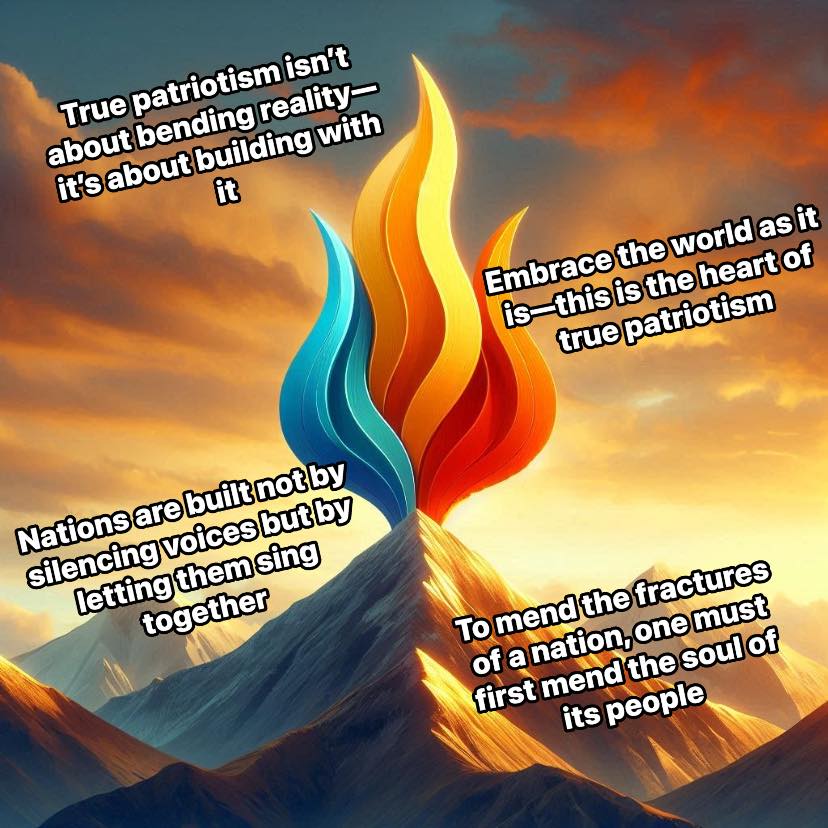
Long ago, in the aftermath of a devastating global war, three young nations emerged from the ashes. Each carried the weight of history and the hope of a better future. They were born into a new world, one that promised equality and progress, and each chose to walk the path of secular governance. Their leaders envisioned societies where laws were written by human hands, inspired by reason and morality, not dictated by ancient texts.
But in each of these lands, two forces began to take shape. One was the Voice of Progress, a call to build nations rooted in shared values and universal principles, independent of religious dogma. The other was the Call of Tradition, a powerful yearning to shape these new states according to sacred laws.
In one nation, the Call of Tradition envisioned a land ruled by divine law, where the faithful would find paradise on earth. In another, they dreamed of a golden age from ancient stories, a time when the gods walked among mortals. In the third, the dream was of a homeland restored to its holy destiny, as promised in ancient scriptures.
At first, the Voice of Progress held sway. The leaders of these young nations worked tirelessly to lay the foundations of modern governance. They built schools, established laws, and dreamed of futures where all citizens could thrive. But the Call of Tradition was not silent. It whispered to the hearts of many, igniting movements and stirring passions.
Years turned into decades, and the Call of Tradition grew louder. Movements took to the streets, leaders rose to power on promises of a return to the divine order, and at times, violence erupted. Blood was spilled, and societies fractured under the weight of the struggle.
And yet, despite all this, the dreams of the Call of Tradition did not come to pass. The divine state was never fully realized. The golden age never returned. The holy homeland remained only a vision. The secular ideals on which these nations were founded, though battered and contested, endured.
Why did the Call of Tradition falter? The answer lay not in the strength of its dreams but in the unyielding nature of reality. Change, true and lasting change, requires more than passion—it demands a confluence of circumstances, a readiness in the hearts of people, and the momentum of history. Even the most fervent leader cannot reshape the world without these forces aligned.
In the decades that followed the war, the world had changed too much. Education spread across the globe, bringing with it new ideas and perspectives. Generations grew up valuing reason, science, and universal human rights. The younger minds in these nations began to align more with the global consciousness than with the traditions of the past.
The harder the Call of Tradition pushed, the more resistance it met. Movements meant to unite often divided. Efforts to create paradise on earth instead sowed discord and instability. The very nations they sought to transform began to crack under the strain.
One day, in a quiet valley, three wanderers from these three nations gathered—a teacher, a poet, and a farmer. They sat beneath a sprawling tree, their faces worn by years of struggle, and shared their stories.
“Why do we fight so hard to remake the world,” the teacher asked, “only to find it slipping further from our grasp?”
“We dream of perfection,” the poet replied, “but in chasing it, we tear apart the good that already exists.”
The farmer, who had listened in silence, finally spoke. “Perhaps we have been trying to shape the world into our dreams, when we should have let our dreams grow from the world as it is.”
The others nodded, their silence heavy with understanding. They realized that true progress wasn’t about bending reality to fit one’s ideals but about working with the world’s complexities. To heal their nations, they needed to embrace the diversity of voices, the challenges of modernity, and the shared humanity of their people.
And so, the three returned to their lands, carrying with them a new message—a message of unity, resilience, and the wisdom of building upon what already exists. Over time, their nations found a fragile but enduring balance. The flames of progress burned brighter, not because they extinguished the Call of Tradition, but because they allowed it to coexist in harmony with other voices.
The three nations continued their journeys, not as perfect utopias but as living, breathing communities. They were marked by challenges but also by hope—a hope that the future would not be dictated by one voice alone, but by the collective chorus of their people, ever adapting, ever growing.

Like
Comment
Share

